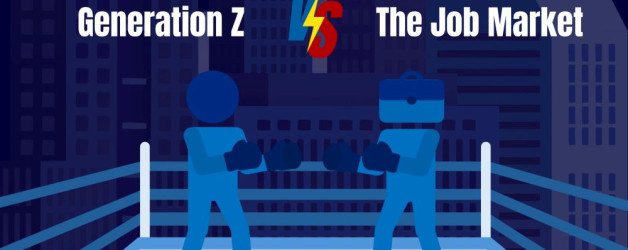Gen-Z vs The Job Market
After graduating from university, it took me a lot longer than I thought to find a job, leaving me frustrated and insecure. I even began to dread family gatherings. When a relative would ask me what I was up to, and I would tell them I was looking for a job, they would never fail to answer with ‘Oh that should be easy, there’s a worker shortage everywhere!’. I knew they meant well but, little did they know I had already been looking for months and was rejected countless times.
But I knew I wasn’t alone in this. Many of my smart and capable fellow Gen Z friends were facing the same problem. Some of them (even the ones much smarter than me) sent over 100 applications and waited several months before they landed their first job. How is it so difficult when the world says it needs us? I wondered.
The decline in entry-level job postings
About a month ago, I stumbled across research that showed me the problem runs deeper than bad luck. It reported that entry-level job postings have fallen by 29 percentage points since January 2024, even as companies experience increasing skill shortages. A paradox emerges: there’s work to be done, but fewer chances to start doing it.
Many companies now expect “work-ready” graduates already equipped with years of experience and advanced skills. But many fresh graduates don’t have the skills or experience required to hit the ground running at their first job. So instead of a worker shortage, as my family referred to, what we are really dealing with is a skills shortage.
At the same time, many sectors (some more than others) are reducing early career opportunities because of AI advancements. Tasks traditionally handled by junior staff are now automated, leaving the more complex tasks for other workers. This is great for efficiency, but sucks for early career opportunities. In addition to that, the uncertainty of the current economy means companies are reluctant to invest in long-term employee development.
The cost of lost beginnings
This isn’t just frustrating, it’s also risky. When young people can’t find stable early-career jobs, it delays more than just income. It affects our identity, confidence and even milestones like moving out or starting a family. And it deepens inequality.
Those blessed with better access to internships and networks stand a much better chance in the job market than those who can’t afford to do internships or don’t have the necessary network to forge relevant connections.
In the long-term, companies also lose. By cutting back on entry-level roles, they risk an erosion of their talent pipeline. The next generation of innovators, leaders, and changemakers can’t emerge without opportunities to grow.
Rethinking how we start
But not all hope is lost. Most importantly, we have to realise that navigating this paradox is a collective endeavour between Gen Z job seekers and students, universities and employers. So, what can we do about it?
Gen Z needs to adapt to the new reality of the job market. Employers are moving to skills-based hiring, making it crucial for us to be able to demonstrate our tangible capabilities. Take advantage of (free) opportunities at university such as workshops, volunteering, joining an association, or going on exchange. If you can, do an internship or find an online skills course.
Universities have the responsibility to prepare students for the job market. They need to rethink their curriculum to blend theory with practice so that students are not only equipped with knowledge, but with valuable experience. Embedding experiential learning through internships and real-world projects, AI literacy and digital skills into the curriculum is key. By cultivating partnerships with employers, they can bridge the gap between what students learn at university and what companies need.
Employers on the other hand need to view their employees as long-term assets. Instead of removing entry-level roles, they can reshape them to include structured training and mentorship, helping young professionals grow while contributing value from day one. At the same time, employers need to consider their relationship with AI to assist worker’s capabilities instead of replacing them.
Lastly, offering paid internships for students has important benefits for the company as well as the interns. For students, they provide valuable work experience and reduce the risk of long-term underemployment after graduation. For employers, they create a more inclusive and loyal talent pool, as interns are found to be more likely to convert to full-time roles and stay longer than other candidates. That’s not just good ethics, it’s good business.
Bridging the gap
The world of work is changing, and the path from university to work is no longer automatic. The paradox of declining entry-level jobs and ongoing skills shortage shows us that the support system for young talent entering the job market needs rebuilding.
At the same time, Gen Z is an ambitious generation eager to grow. If universities and employers equip them with the right resources and experience, we can collectively bridge the gap between education and employment.
Check out the next blog of the series about career ladders by clicking here.
Blog post written by Fleur van der Kooij for Expertise in Labour Mobility
Image by Jizelle Ys for CareerProfessor.works
© 2025 CareerProfessor.works. All Rights Reserved.






